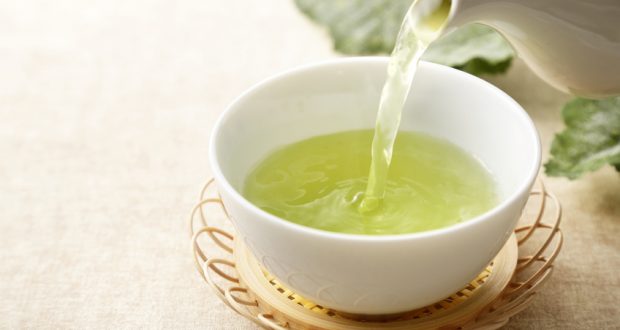There are over 1,500 varieties of tea that fall into 5 main categories: black, oolong, green, white, and pure. Tea can be brewed and consumed hot or cold. The majority of tea drinkers worldwide drink their tea hot. However, here in the United States, 85% of our tea consumption is iced tea.
Turkey drinks the most tea with an astounding 6.8 cups per day on average! Morocco’s residents enjoy 4 cups of tea per day, and Ireland comes in third with 2.9 cups of tea daily.
This article will focus on green tea and the benefits it can bring to your overall health.
One 8 oz. cup of tea contains anywhere between 0-40 mg of caffeine. Green tea contains less caffeine than coffee (which contains about 100 mg of caffeine per cup), but green tea still has enough caffeine to produce an effect. It also contains the amino acid L-theanine, which can work in combination with the caffeine to improve brain function.
According to the Mayo Clinic, up to 400 milligrams of caffeine per day appears to be safe for healthy adults. If we consume more than 400 mg of caffeine daily, symptoms can range from insomnia to irritability. Upset stomach, muscle tremors, and elevated heart rate can also occur.
Studies show that the caffeine in green tea may improve memory and cognitive performance. Caffeine has also been associated with lowered risk for Alzheimer’s and other types of dementia. In fact, research has shown individuals who drink 2 cups of green tea per day have a lower risk of age-related memory problems.
(If you don’t prefer caffeine, or have sensitivities to its effects, caffeine-free varieties of tea are widely available.)
Several studies have claimed that green tea elevates metabolic rate and increases weight loss because of its excellent concentration of flavonoids and catechins. It is particularly effective at reducing the dangerous abdominal fat. Research has found that caffeine can boost metabolism by between 3-11%. Other studies show that caffeine can increase the body’s fat-burning power, by as much as 10% in overweight individuals and as much as 29% in lean individuals.
Green tea does not contain any calories, making it a flavorful replacement for soft drinks and juices. This is especially helpful for diabetics, as it offers a beverage choice that isn’t water, but won’t raise blood sugar. In fact, researchers have found that green tea can improve insulin sensitivity, help keep blood sugar stable, along with reducing fasting glucose levels and Hb A1c concentrations.
Because green tea is the least-processed of all the teas, it contains more antioxidants than any other variety of tea. These antioxidants help prevent against free radical damage to the body’s cells, and fight the spread of viruses and bacteria, thereby lowering the risk of infections.
Green tea’s antioxidant and immune-boosting powers lower risk for a host of diseases from heart disease to cancer. In fact, multiple studies have shown that green tea drinkers have a lower risk of certain cancers like prostate, breast, and colorectal cancers. Green tea also boosts cell health, bone density, and helps deter aging.
Green tea has also been found helpful in improving blood flow and controlling blood pressure. Green tea drinkers enjoy up to a 31% lower risk of cardiovascular disease. Many studies have shown that green tea also lowers the amount of bad cholesterol in the body, and regular consumption of green tea is linked to a reduced risk of stroke.
Whether you take it black, with cream, one lump or two, drinking green tea can have a big impact on your health. So sip, savor, and enjoy!
Sources:
https://www.thequint.com/health/2017/06/05/green-tea-health-benefits
https://authoritynutrition.com/top-10-evidence-based-health-benefits-of-green-tea/
 Diabetic Kitchen
Diabetic Kitchen





2 comments
Pingback: Eating Makes Your Brain Happy-Make Your Body Happy, Too!
Pingback: What Happens When Your "Low-Carb" Diet... Isn't?